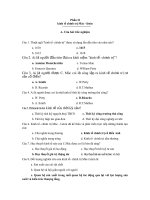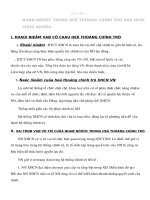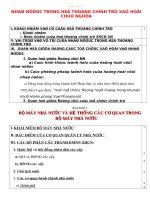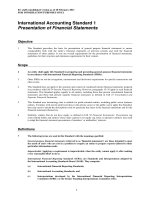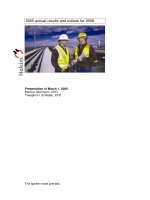LLAS presentation gremler (1)
Bạn đang xem bản rút gọn của tài liệu. Xem và tải ngay bản đầy đủ của tài liệu tại đây (515.1 KB, 29 trang )
The benefits
of video production tasks
as language learning activities
Claudia Gremler
The use of video in the foreign language
classroom
Why do we use it?
How do we use it?
How do students react to it / benefit from it?
Does its use cater to the needs of the media
literate "modern student"?
„His teachers use technology as an event. Outside of
school, he doesn’t separate technology from other
activities. For him, it is air or water, something that he
doesn’t really think about because it’s always available.“
/>
Why use video in the foreign language
classroom?
To train students’ listening skills
To add an audio-visual experience for the students
and provide an alternative or addition to written
materials
To facilitate cultural learning by giving students a
multimedia insight using authentic materials
featuring native speakers
To provide input for group discussions
To impart/acquire background knowledge
For self-study activities
Why use video in the foreign language
classroom?
To train students’ listening skills
To impart background knowledge (CLIL)
(most popular uses amongst language teaching staff at
Aston University)
Most colleagues source video online and
do not edit it!
What are the benefits from the student
perspective?
These are statements which the majority of students
agreed with:
"Visual media helps me understand things better"
"I find it easier to concentrate when visual media are
used in the classroom“
"The use of visual media provides a more authentic
access to the foreign culture"
"It is important that visual media are accompanied
by tasks and activities"
Research questions
What are beneficial video based activities?
What kinds of video based activities are
students familiar with?
And are they successful? (i.e. do they produce a
good learning experience?)
What new activities can be developed and
introduced and how can they be integrated
into the curriculum?
Research questions
What constitutes a succesful learning
process?
Which types of activities can be used to
ensure a successful learning process?
Video based activities
Students were familiar with a wide range of video
based learning activities (listening exercises, group
discussions, role play, written content questions,
grammar exercises, film/media analysis etc.)
They had also previously used many different
types of video in their learning acitivities
(documentaries, news programmes, soaps, feature
films, shorts, adverts, music videos etc.)
Only very few students had tried creative acitivites
such as dubbing or producing their own videos
Video and the learning process
Learning can be seen as a constructivist process
(knowledge construction rather than knowledge
transmission) which
needs be guided through adequate scaffolding
should be contextualised (organised around
authentic meaningful tasks)
The learning activities should also
encourage the learner to be active
contain collaborative elements that ensure
interaction
be emotionally involving and motivating.
Karpinnen 2005;
Masats/Dooly/Costa 2009
Video production and language learning
To ensure that video production tasks foster a
successful learning experience, two methodological
approaches are particularly condusive:
CLIL (Content and Language Integrated Learning) to
integrate the construction of linguistic and nonlinguistic knowledge
PBL (Project-based Learning) to connect the learning
process to students‘ own lives through emotionally
and intellectually engaging tasks
(Masats/Dooly/Costa 2009)
Video Production in Language Learning
http
://divisproj
ect.eu/intro
Video production tasks in LTS (Languages
and Translation Studies) at Aston University
Pioneering activities in Spanish:
Video CVs / diaries / film portraits of other students
(levels 4, 5 and ab initio learners) (not assessed)
Video project in level 6 core language module:
short feature / drama
students write their own script (the script is
assessed, not the video) (20% of 20 credits)
equipment and technical support available in the
department and in the Centre for Learning
Innovation and Professional Practice (CLIPP)
Video production in language learning
http
://divisproj
ect.eu/intro
Video production tasks for IBML (International
Business and Modern Languages) students
IBML is a successful four-year BSc programme at
Aston, taught jointly by the School of Languages
(LSS) and the Business School (ABS)
It is a fully integrated business and language
degree using the CLIL approach.
All "German for Business" modules (core language
modules) contain a business project (worth 20% of
the module mark).
In level 5, all students work on an intercultural
marketing group project.
The Marketing Project on "German for
Business II"
Students are given a popular German (or Austrian)
food product not currently available in the UK.
They are asked to design a marketing campaign
for the introduction of the product in the British
market and pitch it to “representatives” from the
producing company.
Marketing theory is covered in class.
Overall weighting of the project: 20% of a 20 credit
module.
This is a very popular element of the module.
New element: the filming of an advert for the
product (as part of the pitch).
Adverts
In an early stage of the project students study a German
advert with intercultural content (Wagners American Pizza) in
both the German and Austrian version:
/> />
Equipment and technical support
The students use flip cams to record their video and
VideoPad for editing
A brief written guide to the filming is available on
the Aston intranet
Technical support and advice on basic filming
principles is available from
the Learning & Teaching Support team in LSS
Learning technicians in CLIPP
Sample products
Student feedback
was extremely positive overall.
Possible concerns:
How much language practice is actually
involved?
How time consuming is it to produce the advert?
-> Is the low weighting justified?
Do students acquire useful skills?
“Making an advert helped me develop/practice
useful skills”
“Producing an advert helped me engage with
the project”
“This is not a beneficial activity for a language
module”
“Producing an advert is a feature of the
marketing project that should be retained”
Student Comments
“It was as fun as it was educational.”
“Producing the advert added more value to the project
and although it took quite a bit of time to produce it was
thoroughly enjoyable and as a result I enjoyed the
project as a whole more than I think I would have done
without this element. It is something that really engaged
us to work on the project.”
“I found that making the advert as a group helped us work
better together and combine ideas in a productive way. I
think it also made us more enthusiastic about the project
and presentation.”
“The advert should continue to be part of the marketing
project. It is very interesting and it motivates the group to
work well on the project.”
Examples of Student Work
/>dium.m4v
/>0untertitelt%201.wmv
/>


